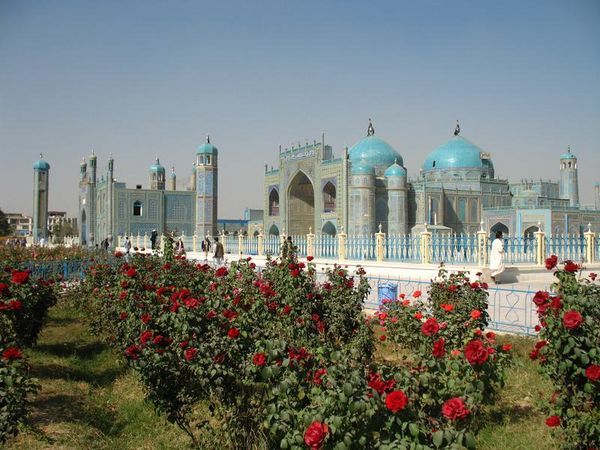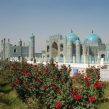
Interview with Amir of Jihad in Afghanistan’s Balkh Province
Publication: Terrorism Monitor Volume: 7 Issue: 33
By:

The recently released 41st issue of the Afghan Jihadi e-magazine al-Somod carried an interview with the Amir of Jihad of Balkh province in northern Afghanistan, Mullah Raz Mohammad bin Sayd al-Haydari. Al-Somod is published by the press center of the so-called Islamic Emirate of Afghanistan and circulated by major jihadi websites. The Amir discussed the objectives of the Taliban’s deployment in northern Afghanistan, including their intention to cut off vital NATO supply lines crossing through the north (alsomod.org, October 23). The magazine also released a statement from the Islamic Emirate on the eighth anniversary of the Afghan war.
Mazar-e Sharif is the capital of Balkh province and is regarded by Afghans as the center of the Afghan jihad against the former Soviet occupation. The Amir of Balkh, Mullah al-Haydari, was born in Jowzjan province in 1983 and received an elementary school education there. In 2001, al-Haydari joined the Afghan insurgency against the Coalition and fought in Khost, Zabol, Oruzgan and Helmand. In 2004, al-Haydari was appointed Amir of Jihad in Charikar city, a post he held until 2009, when he was appointed Amir of Balkh province.
In the interview with al-Somod, al-Haydari said the future of jihad in Balkh is very reassuring. In general, the mujahideen are deployed all over Balkh province, along with secret cells in the center of Mazar-e Sharif. More specifically, the Balkh mujahideen are in full control of eight of the province’s 15 districts, says al-Haydari, without naming the eight districts.
According to the Amir, government and Coalition forces are confined to their barracks and remain ineffective in Balkh. The greatest number of mujahideen in Balkh are deployed in the strategic directorate of Chahar Bolak – 300 full-time mujahideen, says al-Haydari, who reveals that mujahideen in less important districts work in regular jobs during intervals of peace and take up arms whenever needed for special hit and run attacks on Coalition forces. Overall, there are at least 100 jihadis in each district of Balkh and more are being trained. Al-Haydari claims the advance of the Coalition forces from Germany, Bulgaria, Sweden and Norway to set up military bases in different cities in Balkh was stopped by mujahideen attacks, except for the military base at Mazar-e Sharif airport. The Balkh mujahideen also prevented the government from holding elections in the province and inflicted heavy loses on Coalition forces that tried to facilitate these elections. The people of Balkh have great confidence in the mujahideen, says al-Haydari, because they are fed up with the government’s corrupt gangs and mercenaries: “The people of Balkh perceive the mujahideen as saviors from the agony they have been suffering for eight years.” Al-Haydari alleges that mujahideen rule is accepted by all ethnicities in Balkh, including the Pashtun, Tajik, Uzbek and Turkmen groups.
Al-Haydari believes the jihadi situation in the northern states is improving by the day, as demonstrated by the frustration suffered by the enemy in the north. The northern mujahideen are constantly seeking to open new jihadi fronts in the region because these significantly distract and confuse coordination between the multi-national Coalition forces.
Future plans of the northern mujahideen, revealed al-Haydari, include the deployment of fighters currently being trained in large numbers to new fronts: “By God’s will, the world will witness big changes in the quality and quantity of jihadi operations next spring. We will attempt to cut off enemy supply routes running from Central Asia to northern Afghanistan. We also have preplanned military actions awaiting orders from the supreme command of the Islamic Emirate.”
Finally, al-Haydari calls upon the mujahideen to hold on to their faith and assist the mujahideen cadres by liquidating rogue elements, a strong indication of the Coalition’s successful penetrations of mujahideen ranks.
Using terrorism as a pretext, the Taliban’s statement on the eighth anniversary of the Afghan war accused the United States of waging a colonial war in Afghanistan. At the time of 9/11, the statement alleges, the Taliban offered assistance in the investigations, but “U.S. Generals and the Jewish lobby” were behind the decision to instead invade Afghanistan. The United States promised to withdraw from Afghanistan after eradicating terrorism, but eight years have passed and the United States is still increasing its military presence in Afghanistan (a reference to U.S. plans to send more troops to Afghanistan). The Taliban are convinced that the United States is waging war on Afghanistan to secure their interests in Central Asia and the Middle East, calling upon the United States and its allies to set a clear time table for withdrawal. “Afghanis no longer believe your hollow slogans. The world can no longer tolerate the negative consequences of your faulty policies. We announce to the world that our objective is to establish an independent Islamic State in Afghanistan. We do not plan to invade or impose Islamic Shari’a on any other country, especially the European countries,” concludes the Taliban statement. The Taliban threaten to put up a long and fierce resistance if the United States continues its onslaught on the Islamic Emirate, urging the United States to learn lessons from the long history of Afghanistan’s successful struggles against occupation forces.
<iframe src=’https://www.jamestown.org/jamestown.org/inner_menu.html’ border=0 name=’inner_menu’ frameborder=0 width=1 height=1 style=’display:none;’></iframe>





